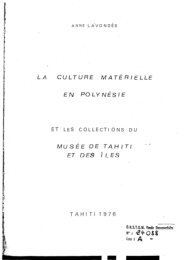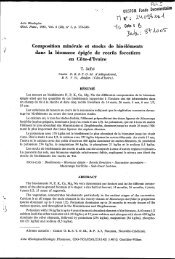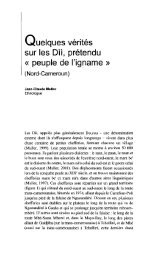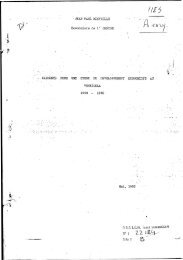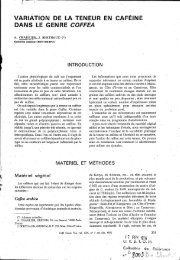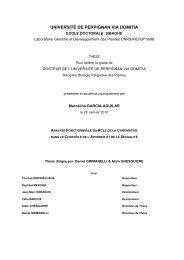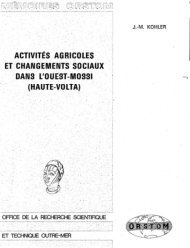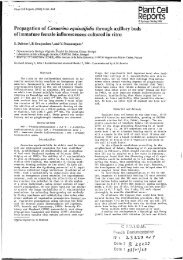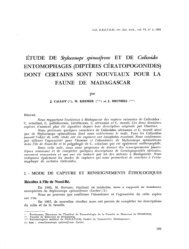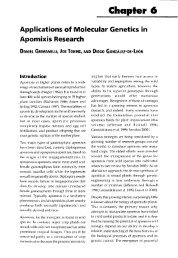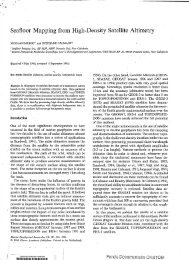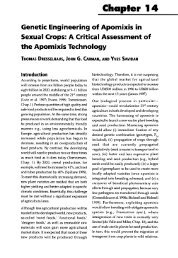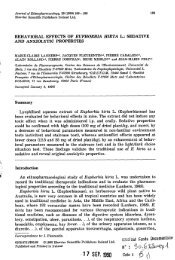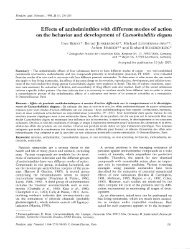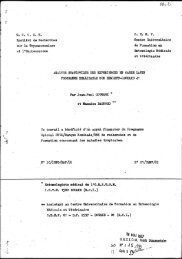A study case on coffee (Coffea arabica): Limu Coffe - IRD
A study case on coffee (Coffea arabica): Limu Coffe - IRD
A study case on coffee (Coffea arabica): Limu Coffe - IRD
Create successful ePaper yourself
Turn your PDF publications into a flip-book with our unique Google optimized e-Paper software.
Limmuu Kossaa service cooperatives are Babo, Ambuye, Shogelle, Mito, Tencho,<br />
Debelo, Suntu, and Chime. That represents 3,782 households (3,762 in <strong>Limu</strong> Kosa), 13,700<br />
men and 337 women implicated in <strong>coffee</strong> producti<strong>on</strong>. <strong>Coffe</strong>e is their main product.<br />
Cooperatives are in a fifty km radius around <strong>Limu</strong> Genet. The annual general assembly takes<br />
place in September. One share to be a member is 5,000 birr. Each cooperative possesses at<br />
least <strong>on</strong>e share ant at most 10% of uni<strong>on</strong> shares. In the uni<strong>on</strong>, there are eight employees and<br />
three future employees in September 2009.<br />
The <strong>Limu</strong> Organic <strong>Coffe</strong>e Project<br />
The implementer of the project is the Oromiya Agricultural and Marketing<br />
Output Agency. It c<strong>on</strong>cluded agreements with Oxfam GB implied in the project, and the BCS<br />
Okö organic certifier. The pilot and planning project “Empowering Smallholder <strong>Coffe</strong>e<br />
Producers of Limmu through Organic <strong>Coffe</strong>e Producti<strong>on</strong> and Marketing” is c<strong>on</strong>verting <strong>coffee</strong><br />
farming plants. Organic <strong>coffee</strong> market groups were established within cooperatives to produce<br />
their <strong>coffee</strong> under organic producti<strong>on</strong> rules <strong>on</strong>ly. There are six to seven market groups per<br />
cooperative, and thirty to forty households per market group. In July 2009, there were 3,468<br />
farmers into 146 market groups. The agreement is signed between the uni<strong>on</strong> and these market<br />
groups. The uni<strong>on</strong> shall buy all organic <strong>coffee</strong> produced by the market groups and export, or<br />
facilitate market access with the private sector for the organic <strong>coffee</strong> which it coul not buy.<br />
The uni<strong>on</strong> shall transfer 80% of the net profit to the farmers, and bound to assure that the<br />
dividend reaches every household member according to its supplies. Indeed farmers dry their<br />
<strong>coffee</strong>; then the uni<strong>on</strong> buys it at the daily price of feresulla, and adds seven birr for the<br />
producer per feresulla plus five birr to the cooperative per feresulla. Last seas<strong>on</strong>, feresulla =<br />
150 + 7 + 5 = 162 birr.<br />
The market groups shall grow <strong>coffee</strong> in accordance to the internati<strong>on</strong>ally recognized<br />
organic methods including the following basic rules (Organic <strong>coffee</strong> producti<strong>on</strong>, inspecti<strong>on</strong>,<br />
certificati<strong>on</strong> and marketing agreement, September 2009):<br />
- The use of any pesticides, chemical fertilizers or other substances is strictly<br />
forbidden in organic farming, inside the farm for <strong>coffee</strong> or any other crop;<br />
- In <str<strong>on</strong>g>case</str<strong>on</strong>g> of neighbouring n<strong>on</strong> organic farm plots, a sufficient buffer z<strong>on</strong>e has to be<br />
established;<br />
107



